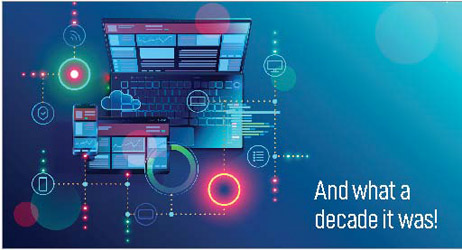
Editor’s Note: As we start a new year – and a new decade – Kate and her colleagues at Post Computers took a look back at all the advances in the world of consumer tech over the past 10 years. And what a decade it was! Here’s the first installment of what became a two-part retrospective. We’ll take a look at 2015-2019’s innovations in our February edition!
By Kate Thresher and The Team at POST Computers
prime@pocosys.com
January 2020. The beginning of a new decade. There’s no doubt that technology changes quickly, but just how much has happened over the past 10 years? Here’s a look at some tech highlights through the decade.
2010
Apple unveiled the first iPad. Though not the first tablet computer, the iPad catapulted this tech into the hands of millions and began the huge rise of touch computing that would gain popularity (and accuracy) in the coming years.
Throughout this year, the smart phone giants were at war for supremacy. Prior to this year, Apple and Blackberry were the only main contenders with companies like Palm starting to fade out, but with the rise of Google’s Android system and Microsoft announcing it’s first Windows based phone, the field was about to get a little more crowded.
2011
2011 saw the rise of cloud computing, non-local storage, and the need for businesses to pay attention to where data was stored. This technology also ushered in the age of “hacktivism” – account break-ins and hacking for both individual and corporate accounts.
With the rise of tablet devices and eReaders such as Kindle, eBooks have been steadily growing in popularity, however according to a report put out by Amazon, this year eBook sales surpassed paperback sales on U.S. markets.
2012
Television is by no means a new concept in 2012, but taking your cable channels with you wherever you go has become a “thing” this year. Some networks are offering mobile streaming – wherever you have an internet connection, you have your TV.
2012 boasts the launch of Apple’s Siri voice control bot with the iPhone 4S. Siri allows you to call, text, set reminders, and search using just your voice. Voice recognition is not new this year, but Apple put it in the hands of common people and made it more accurate than it had been in the past (although you can still find some pretty good cases of Siri blunders if you’re looking for a laugh).
2013
2013 was a year of predictions. Here are a few predictions from 2013 and what really happened:
2013 also saw the first non-specialized drone to hit the mass consumer market, thanks to DJI.
2014
Mobile/cloud collaboration became big this year with productivity software such as Microsoft Office and Quip hitting mobile devices. Cloud sharing though sources such as OneDrive and Google Drive has also gotten big, allowing for instant sharing, collaboration, and in document editing making the middle steps of collaboration unnecessary.
Apple Pay was released this year (with more companies like Google and Samsung soon to follow suit) making carrying credit cards unnecessary – according to the tech companies at least. With this technology, users can pay directly from saved credit card information on their phone using biometrics and single PINs for security. At this point in time, many stores aren’t accepting mobile payment, and many credit card companies aren’t partnered with Apple and Google either. We’ll have to wait a few more years for this to become more mainstream, but even going into 2020, true security is still a risk.
POST Computer Systems has been serving the Western Mass. community since 1992. Started in a basement in Wilbraham, the company continues to grow year after year thanks to the strength of their service department and the continued support from the local community.
If you have any questions or concerns, or to request a future Prime article topic, please reach out to the crew at POST Computer Systems by emailing: prime@pocosys.com